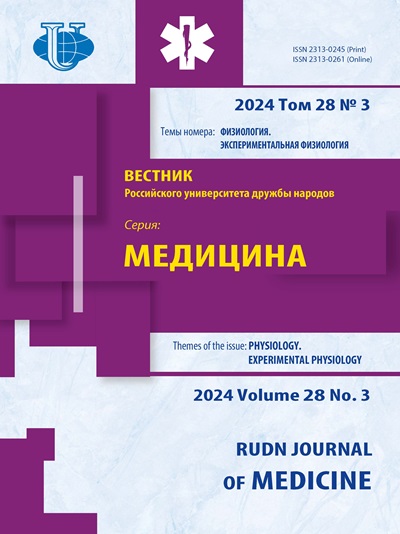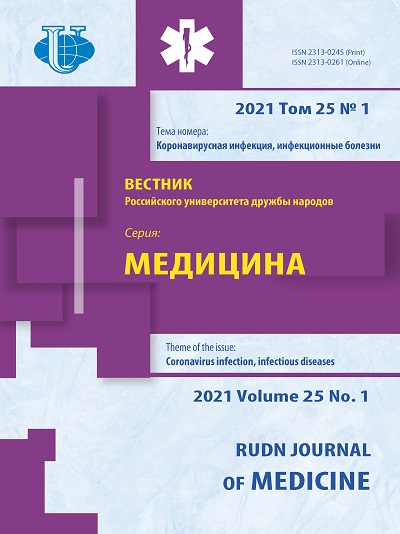Индометацин и SARS-CoV-2: перспективы терапии воспаления в клинике
- Авторы: Кодидала С.Р.1, Сороут Д.1, Джаячандра С.2, Нарапогу В.3
-
Учреждения:
- К.Д. Медицинский колледж, клиника и исследовательский центр
- Медицинский колледж Зидус
- Государственный медицинский колледж
- Выпуск: Том 25, № 1 (2021): КОРОНАВИРУСНАЯ ИНФЕКЦИЯ, ИНФЕКЦИОННЫЕ БОЛЕЗНИ
- Страницы: 25-30
- Раздел: КОРОНАВИРУСНАЯ ИНФЕКЦИЯ, ИНФЕКЦИОННЫЕ БОЛЕЗНИ
- URL: https://journals.rudn.ru/medicine/article/view/25434
- DOI: https://doi.org/10.22363/2313-0245-2021-25-1-25-30
Цитировать
Полный текст
Аннотация
Тяжелый острый респираторный синдром (SARS) - это пандемия (называемая SARS-CoV-2 или COVID-19), вызванная неизвестным семейством коронавирусов РНК-вируса (SARS-COV). Фенотип может варьироваться от бессимптомного до молниеносного цитокинового шторма, который приводит к полиорганной недостаточности и смерти. Тем не менее мир с нетерпением ждет, когда противовирусный препарат остановит заражение вирусом короны. Предыдущие исследования показали, что индометацин обладает способностью подавлять репликацию РНК и ДНК-вирусов. Цель . Интерлейкины (IL), интерфероны (IFN) и метаболиты, такие как «циклопентанциклооксигеназа» (COX 1 / COX 2), активны против нескольких вирусов РНК. Эксперты разделили инфекцию SARS на три фазы (фазы 1, 2, 3) в зависимости от степени тяжести инфекции. В фазе 3 наблюдался «цитокиновый шторм» из-за сильного воспаления, которое могло повредить органы и даже привести к летальному исходу. Мы исследовали влияние индометацина на ингибитор ЦОГ на репликацию коронавируса и цитокиновый шторм в снижении гипервоспалительного состояния. В этой статье мы попытались оценить клиническое лечение воспаления, вызванного SARS-COV-2, с помощью индометацина. Полученные результаты. Индометацин может облегчить боль при глубоком вдохе у пациентов, инфицированных вирусом короны. Индометацин можно считать безопасным и эффективным для профилактики и лечения коронавирусной инфекции, а также противовирусной активностью. Выводы . Индометацин - мощный ингибитор SARS CoV-2.
Ключевые слова
Об авторах
Сатьянатх Р. Кодидала
К.Д. Медицинский колледж, клиника и исследовательский центр
Автор, ответственный за переписку.
Email: ksatyanath1989@gmail.com
г. Матхура, Индия
Дж. Сороут
К.Д. Медицинский колледж, клиника и исследовательский центр
Email: ksatyanath1989@gmail.com
г. Матхура, Индия
С. Джаячандра
Медицинский колледж Зидус
Email: ksatyanath1989@gmail.com
г. Даход, Гуджарат, Индия
В. Нарапогу
Государственный медицинский колледж
Email: ksatyanath1989@gmail.com
г. Будаун, Уттар-Прадеш, Индия
Список литературы
- Huang C, Wang Y, Li X, et al. Clinical features of patients infected with 2019 novel coronavirus in Wuhan, China. Lancet. 2020;395(10223):497-506.
- Zhou P, Yang X-L, Wang X-G, et al. A pneumonia outbreak associated with a new coronavirus of probable bat origin. Nature. 2020:10.1038/s41586-41020-42012-41587.
- Xu H, Zhong L, Deng J, et al. High expression of ACE2 receptor of 2019-nCoV on the epithelial cells of oral mucosa. Int J Oral Sci. 2020;12(1):8.
- Cao Y, Li L, Feng Z, et al. Comparative genetic analysis of the novel coronavirus (2019-nCoV/SARS-CoV-2) receptor ACE2 in different populations. Cell Discovery. 2020;6(1). doi: 10.1038/s41421020-0147-1.
- Shi Y, Wang Y, Shao C, Huang J, Gan J, Huang X, Bucci E, Piacentini M, Ippolito G, Melino G. COVID-19 infection: the perspectives on immune responses. Cell Death Differ. 2020;27(5):1451-1454. doi: 10.1038/s41418-020-0530-3.
- Arend W.P. Interleukin-1 receptor antagonist. Adv Immunol. 1993;54:167-227.
- Burger D, Chicheportiche R, Giri JG, Dayer JM. The inhibitory activity of human interleukin-1 receptor antagonist is enhanced by type II interleukin-1 soluble receptor and hindered by type I interleukin-1 soluble receptor. J Clin Invest. 1995;96:38-41.
- Conti P, Ronconi G, Caraffa A, Gallenga CE, Ross R, Frydas I, Kritas SK. Induction of pro- inflammatory cytokines (IL-1 and IL-6) and lung inflammation by Coronavirus-19 (COVI-19 or SARS-CoV-2): anti-inflammatory strategies. Masters P.S., Perlman, S. Coronaviridae. In: Knipe D.M., Howley P. (eds) Fields Virology. Lippincott Williams and Wilkins, Philadelphia, PA. 2013:825- 858.
- Brunton LL, Parker L, Blumenthal DK, Buxton ILO. Goodman and Gilman’s Manual of Pharmacology and Therapeutics. New York: McGraw-Hill Medical, 2008:446-47.
- Amici C, Di Caro A, Ciucci A, et al. Indomethacin has a potent antiviral activity against SARS coronavirus. Antivir Ther. 2006;11:1021-30. https://hospitalhealthcare.com/covid-19/indomethacin-has-a-positive-impact-on-covid-19-symptoms.
- Brunton LL, Parker L, Blumenthal DK, Buxton ILO. Goodman and Gilman’s Manual of Pharmacology and Therapeutics. New York, NY: McGraw. Hill Medical. 2008:446- 447.
- Day M. Covid-19: ibuprofen should not be used for managing symptoms say doctors and scientists. BMJ. 2020;19:m1086.
- Gupta R, Misra A. Contentious issues and evolving concepts in the clinical presentation and management of patients with COVID-19 infection with reference to use of therapeutic and other drugs used in co-morbid diseases (Hypertension, diabetes, etc.). Diabetes Metab Syndr. 2020;14:251-254.
- Updated: WHO now doesn’t recommend avoiding ibuprofen for COVID-19 symptoms. https://www.sciencealert.com/whorecommends-to-avoid-taking-ibuforfin-for-covid-19-symptoms.
- Chmiel JF, Konstan MW, Accurso FJ, et al. Use of ibuprofen to assess inflammatory biomarkers in induced sputum: implications for clinical trials in cystic fibrosis. J Cyst Fibros. 2015;14:720-726.
- Zhang W., Zhao Y., Zhang F., et al. The use of anti-inflammatory drugs in the treatment of people with severe coronavirus disease 2019 (COVID-19): the perspectives of clinical immunologists from China. Clin Immunol. 2020;214:108393.
- Lucas S. The Pharmacology of Indomethacin. Headache. 2016 Feb;56(2):436-46.
- Draper MP, Martell RL, Levy SB. Indomethacin-mediated reversal of multidrug resistance and drug efflux in human and murine cell lines overexpressing MRP, but not P-glycoprotein. Br. J. Cancer. 1997;75(6):810-5.
- Vane JR, Botting RM. Mechanism of action of antiinflammatory drugs. Adv Exp Med Biol. 1997;433:131-138.
- Tegerder I, Pfeilschifter J, Geisslinger G. Cyclooxygenase- independent actions of cyclooxygenase inhibitors. FASEB J. 2001;15:2057-2072.
- Amici C, La Frazia S, Brunelli C, Balsamo M, Angelini M, Santoro MG. Inhibition of viral protein translation by indomethacin in vesicular stomatitis virus infection: role of eIF2α kinase PKR. Cell. Microbiol. 2015;17(9):1391-404.
- Hoppmann RA, Peden JG, Ober SK. Central nervous system side effects of nonsteroidal anti-inflammatory drugs. Aseptic meningitis, psychosis, and cognitive dysfunction. Arch. Intern. Med. 1991;151(7):1309-13.
















